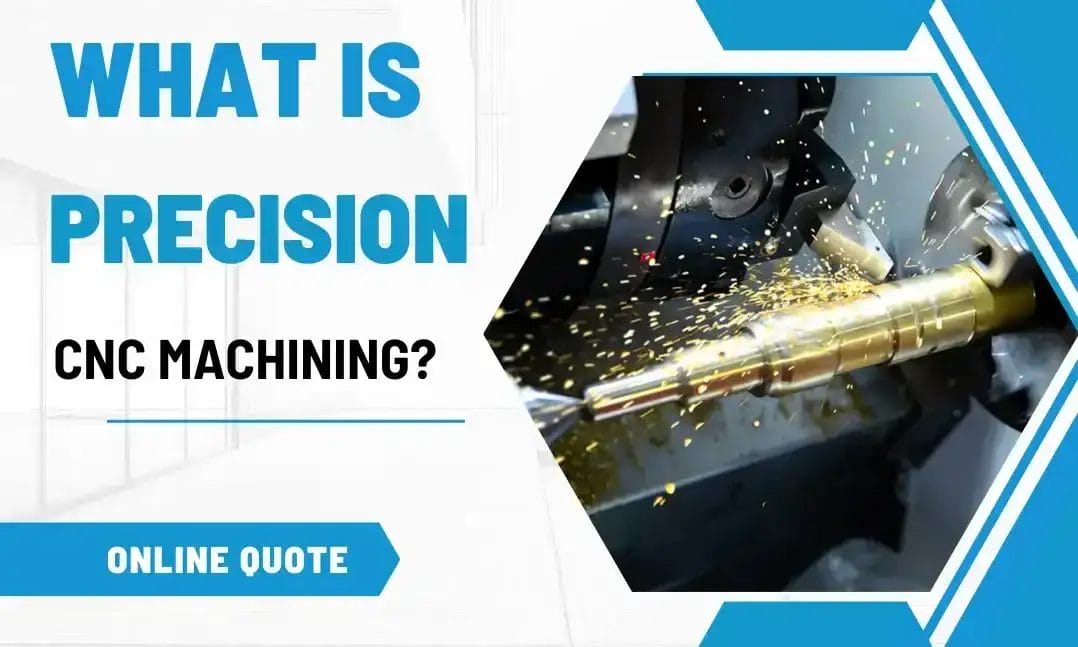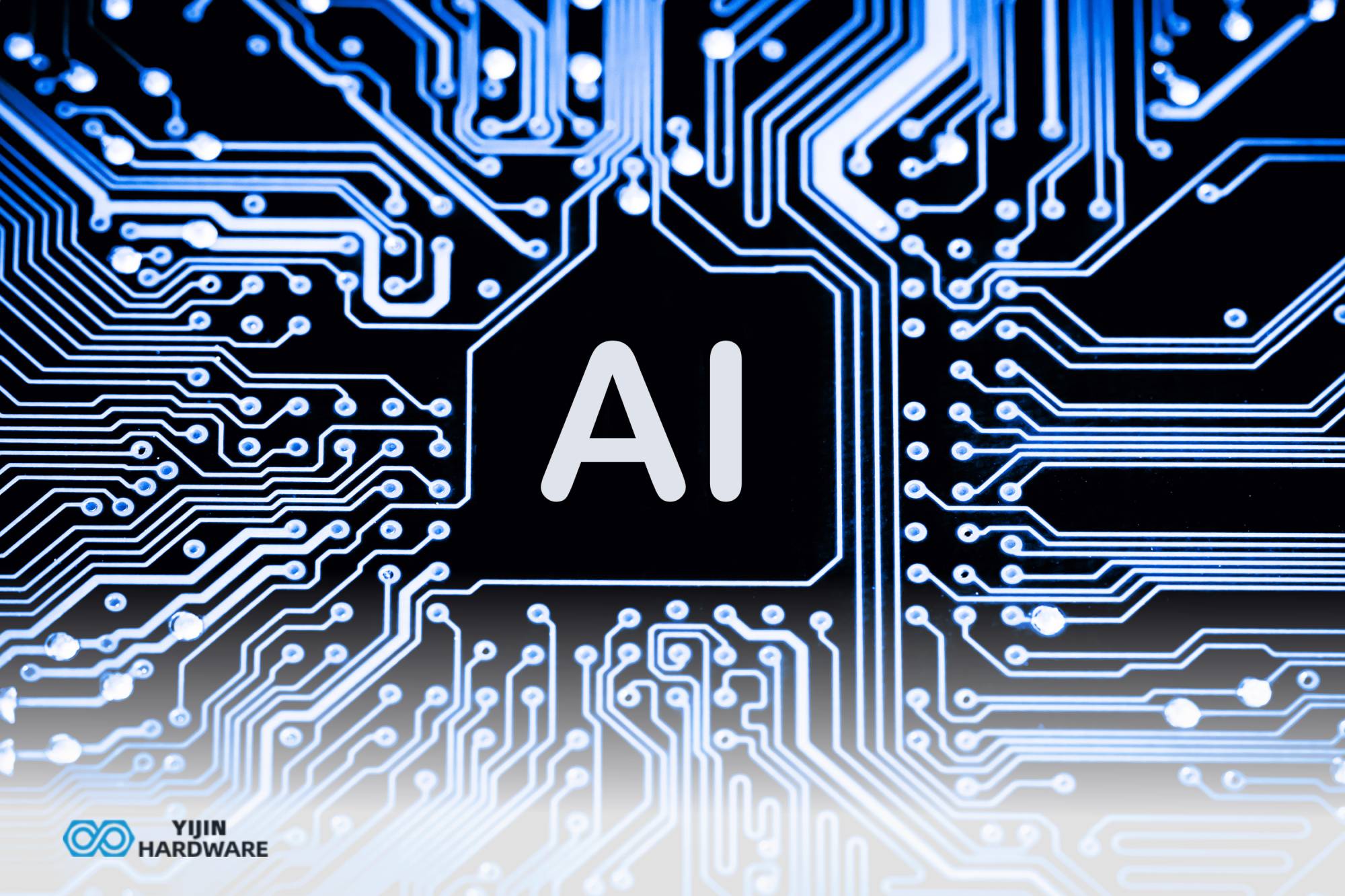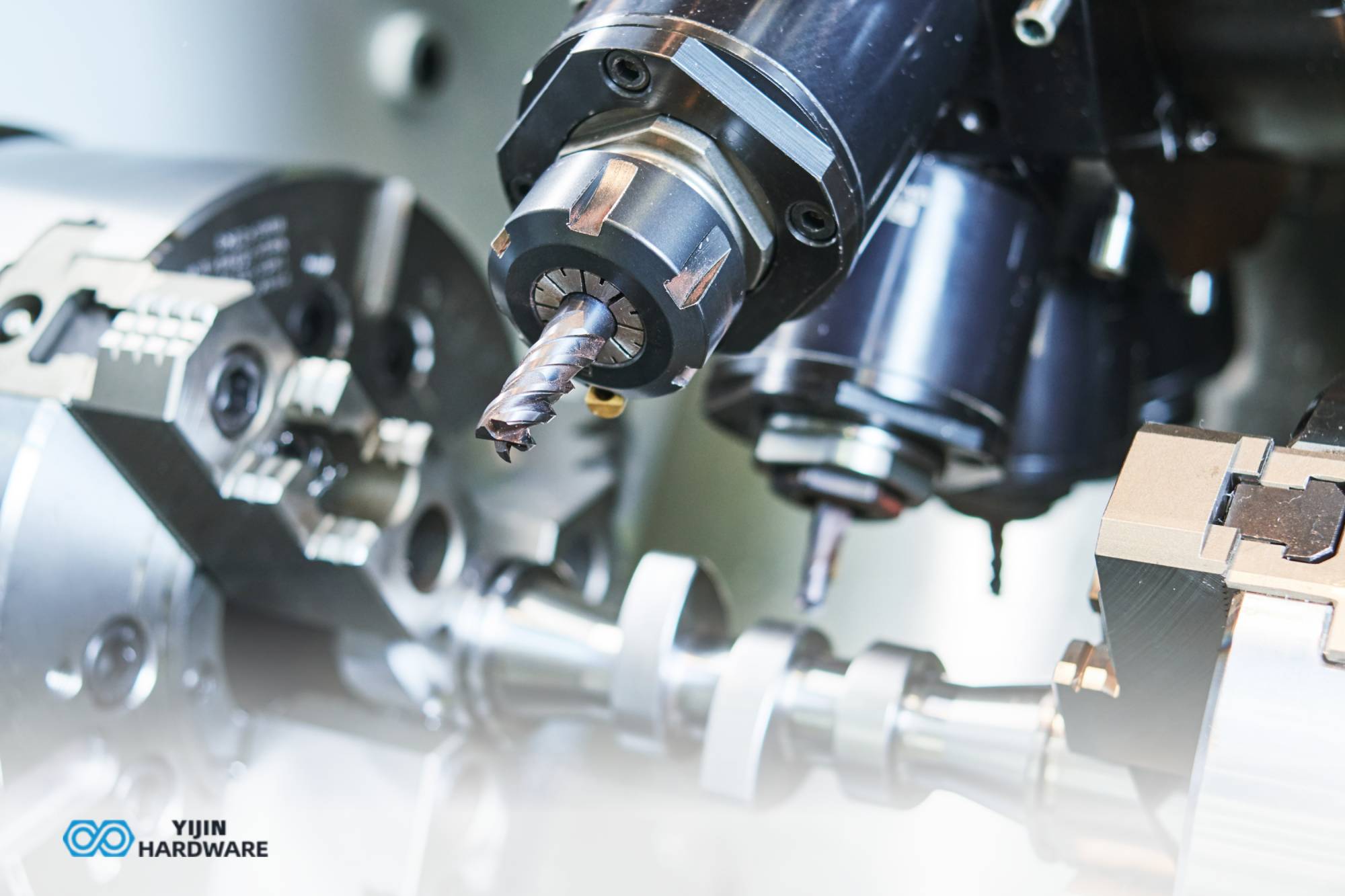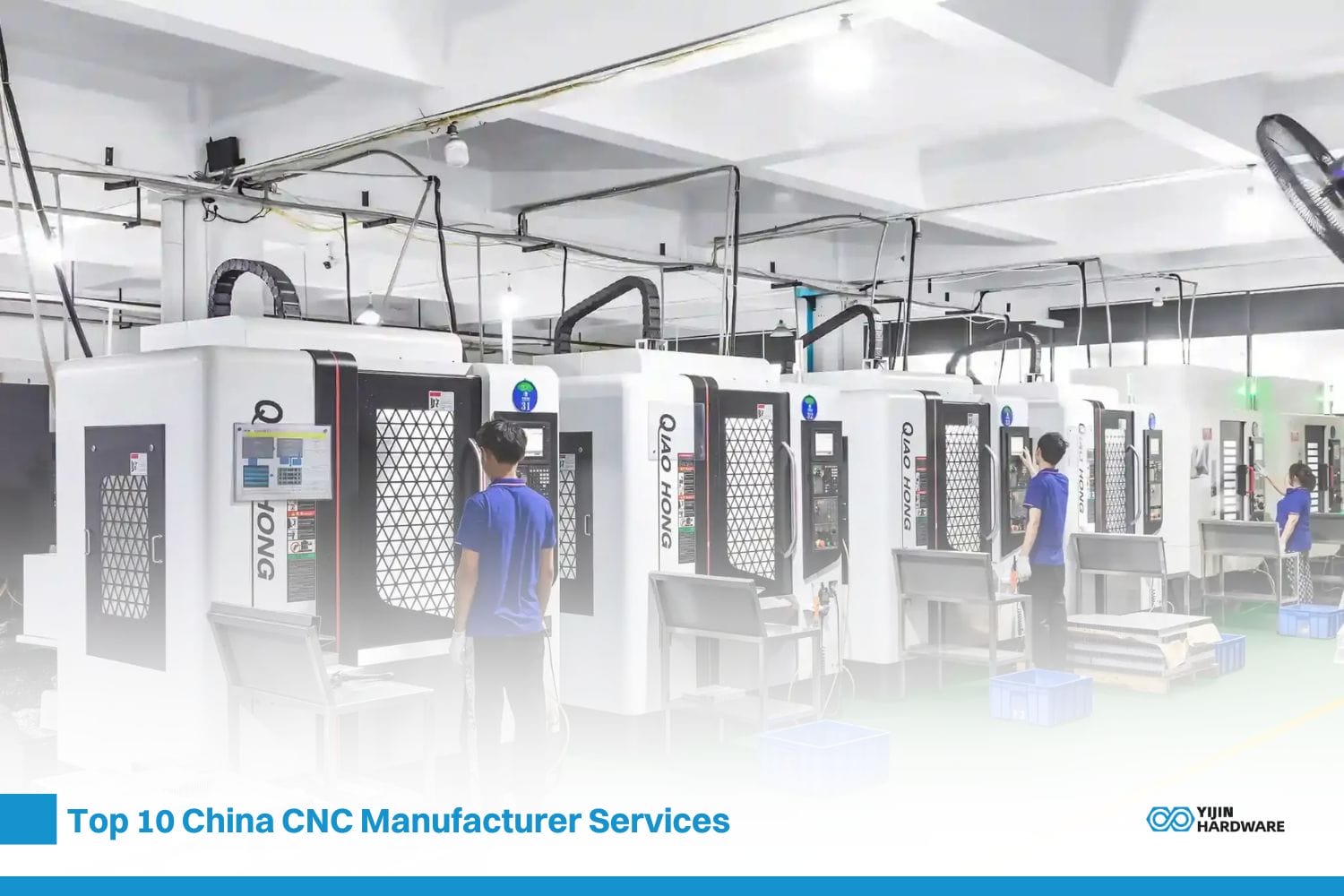Have you ever noticed metal implants in a human body or complex engine parts in cars and airplanes? How do they take such precise shapes? It is all because of CNC precision machining. Precission CNC machining parts go through a complex manufacturing process.
The journey of these fine-shaped custom parts starts with manufacturing, where CNC machining companies transform raw materials into the products we use daily. Since the demand for more accurate parts is rising, precision CNC machining services are in high demand. These companies incorporate advanced-level precision techniques.
This high-level ability of computer numerically controlled machines features in the micron and even nanometer range. Now, the development of miniaturized components in various fields is possible. The principal beneficiaries of this development are:
- Medical devices
- Electronics,
- Micromechanical systems (MEMS)
What is precision CNC machining?
High-precision CNC machining is a specialized form of manufacturing that uses CNC technology and highly accurate CAD models to manufacture parts with very tight tolerances. Often, beginners do not understand the concept of tolerance. Let us explain in simple words. It is tough to meet dimensional accuracy in traditional CNC machining CAD design.
On the other hand, in high-precision CNC machining, working with dimensional accuracy becomes a paramount choice. For instance, in traditional CNC machining, if the tolerance is a few hundredths of a millimeter, but in high precision CNC machining, they can be as small as a single micron. It is equal to the width of human hair.
Let’s think of another way by giving a typical example.
Regular machining is like baking a cake following a recipe. You will find some gaps in design and width. Precision CNC machining is like using a 3D printer to make a cake, which precisely prepares the product following the given design.
Also Read:
What Is CNC Machining?
Examples of Precision CNC Machined Parts
- Surgical instrument
- rocket engine parts
- joint replacements
What Is The Difference Between CNC Machining and Precision Machining?
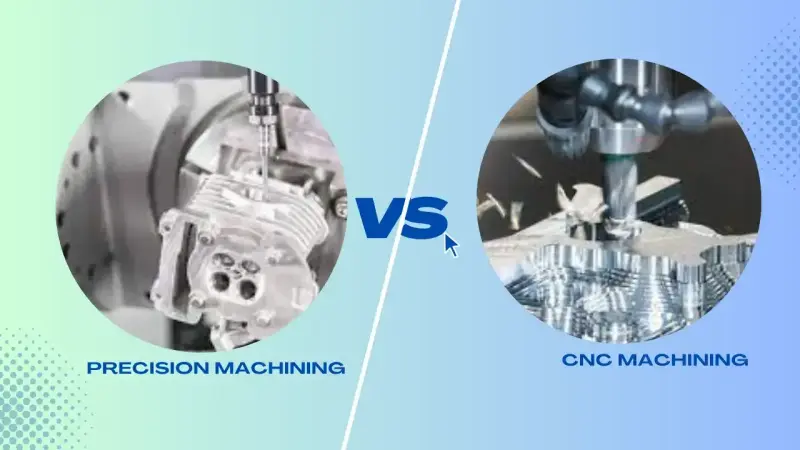
Compared to traditional CNC machining, high-precision CNC machining involves tighter tolerances. Moreover, this method meets the high level of dimensions. The deviations are minimal. Manufacturing CNC precision machining parts demands high accuracy, precise tooling, and impeccable programming techniques.
Similarly, precision machining provides smoother surfaces compared to traditional machining methods. However, precision CNC machining typically incurs higher costs due to maintaining the quality standards.
Precision CNC machining is different from traditional machining in multiple ways, such as:
| Features | CNC Machining | Precision CNC Machining |
| Focus | General-purpose machining | Manufacturing custom with extremely tight tolerances |
| Tolerance Level | Broader range, typically in the 0.005 – 0.1 mm (0.0002 – 0.004 in) range | Tolerances range in the micron (thousandth of a millimeter) range |
| Repeatability | Good repeatability | Exceptional repeatability with minimal variations |
| Machine Types | Mills, lathes, routers, etc. | High-precision CNC machines |
| Applications | Suitable for a wider range of parts, from prototypes to production components | Medical devices, aerospace components, and other complicated molds |
| Cost | Generally less expensive | More expensive |
Also Read:
CNC Machining vs Injection Molding
CNC Machining vs Manual Machining
Advantages of Precision CNC Machining

Precision CNC machining delivers significant advantages. Currently, the most modern manufacturing method allows you to make custom metal parts with the most complex designs. Interestingly, with precision CNC machining, we can achieve high accuracy. That is what makes it dominant over other manufacturing methods.
Precision CNC machining’s most crucial advantage is the high precision of manufactured elements, which is practically impossible to achieve in the case of manual processing.
These capabilities translate into several advantages for different industries. Let’s take a deeper look:
Higher Accuracy and Repeatability
Precision CNC machining particularly excels in measuring tolerances in microns. These tolerances ensure that all final products meet the desired results. For instance, their performance should be optimum in industries like medical devices and aerospace components.
Since CNC precision machining is an automated technology, it eliminates even minor human errors during the machining process. Each part is manufactured in a replica of the design, ensuring flawless repeatability.
Freedom Of Design
Precision CNC machining can efficiently handle complex designs and geometries. On the other hand, traditional machining struggles with making parts with complex designs. By incorporating, advanced toolpaths and 4-Axis Machining /5 Axis machining capabilities, high-precision CNC machining centers can manufacture high-precision parts with any complexity.
Ultimately, these features give exceptional freedom to the CNC parts designer to play with any design that greatly fits the machines for better performance. Hence, they can make more precise parts required for the medical and automotive industries.
Read More:
5-Axis CNC Machining Companies In China
Wider Choices of Materials
One of the best features of precision CNC machining is its ability to execute a variety of materials. Its capability is not specific to the metals only but it can work on plastic and other exotic materials like titanium and Inconel. Hence, this feature allows the manufacturers and designers to choose the best material to fulfill their project requirements.
Since mass production is costly, a better choice of material is far more important so a specialized high-precision CNC machining service can effectively guide you about this.
Excellent Productivity and Efficiency
CNC machining has an excellent productivity rate. Not only this, but it can accelerate the prototyping process to make custom parts in large batches. Carrying the entire process on high-precision machines accelerates the efficiency of these parts. Hence, we can effectively control the cost and produce efficient parts with rapid turnaround time without losing the quality.
Also Read: What Is CNC Prototype Machining: Beginners Guide
Enhanced Safety
Modern CNC machines are completely automated which minimizes human interference significantly. Similarly, there is minimal need for human labor to execute different operations. So there are hardly any chances of accidental injuries. Furthermore, precision machining companies place these machines in enclosed spaces where there are few chances of dust and fumes. Ultimately, it leads to a better and safer working environment.
What Is The Tolerance Of Precision Machining?
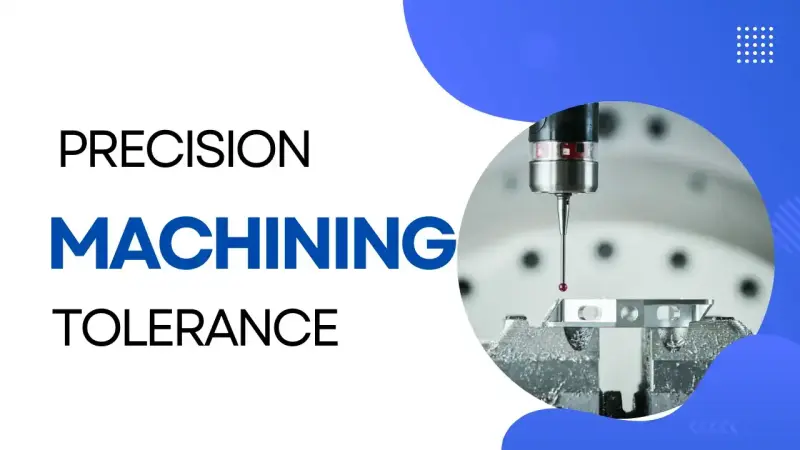
Tight tolerance and repeatability define the level of accuracy and consistency in the high-precision CNC machining parts manufacturing process. If we look into the definition of precision machining tolerance, it represents the acceptable range within which the actual machined dimension can vary.
Generally, these variations are written in units like millimeters (mm) or inches (in). The smaller the indication, the higher the precision will be.
What is the significance of tolerance in precision machining?
Tolerances directly impact the performance of the final product. Tight tolerances ensure that all assembled parts work together smoothly without any issues. For instance, a bearing with lose tolerance causes fruition during operation. It will lead to premature wear and tear.
Subsequently, the tight tolerance of precision CNC machining parts makes the assembly extremely convenient. Simultaneously, good tolerance will lead to cost-effective machining.
Different Types of Tolerances
There are generally two types of tolerances
Dimensional Tolerances
Dimensional tolerances mean the acceptance level of variation in size features like length, width, height, and hole diameters.
Geometric Tolerances
Compared to geometric tolerances, geometric tolerances are defined as allowable deviations in form and position of the custom metal parts.
5 Factors Affecting Tolerances in Precision CNC Machining
- Machining capabilities
- Tool Wear
- Material Properties
- Fixturing
- Workholding
Types of CNC Precision Machines

There are different types of precision CNC machines available to make precision parts. Understanding the features of each type is crucial for a successful project.
CNC Mills
CNC milling machines use rotating tools for the material—cutters, with instructions for machining the material coming from a CAD file. For businesses needing efficient production of complex designs, a trusted cnc milling parts factory can deliver reliable solutions for both prototypes and large-scale projects.
CNC Lathes
Modern CNC lathes use, among others: flat knives, which increase the space allocated for the machining area. As a result, CNC lathes are the preliminary choice for high-precision CNC machining. They excel at manufacturing precise metal parts like shafts, fittings, and bushings. If you’re looking for top-tier CNC precision turning parts, partnering with a reliable provider ensures consistent quality and accuracy tailored to your project needs.
Swiss Lathes
The Swiss-style lathe provides a cost-effective way to produce small, complex, and high-precision CNC machined parts. One thing is to remember that manual programming on a controller is unproductive. Thanks to the intuitive channel synchronization manager, programming setting, milling, and turning operations on the main and rear spindle and synchronizing them is simple and effective.
Applications of Precision CNC Machining
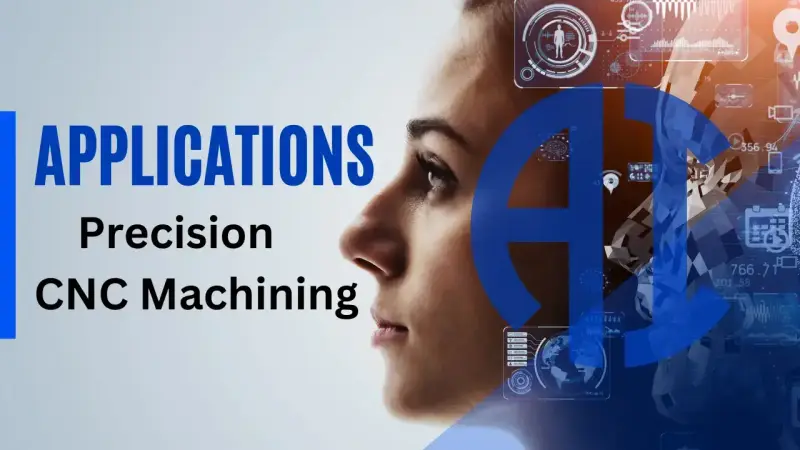
After the integration of modern high-precision CNC machining technology, the application range of machined parts has expanded significantly. Below, we shall overview some major industries where precision machined parts are being used.
Aerospace Industry
The aerospace industry is one of the biggest beneficiaries of high-precision machined parts. Both aviation and aerospace have been receiving complex engine parts from machining companies for many years. Some of the prominent parts being used in these industries are landing gear, fuselage Sections, turbine blades, and combustion chambers.
Also Read: Guide to Aerospace CNC Machining
Automotive Industry
The automotive industry regularly uses precision parts in manufacturing metal cylinder blocks, gears, pins, valves, axles, and other details, as well as dashboard and indicator elements made of plastic.
Precision CNC machines are also incorporated to produce prototype car parts and spare parts. The reason is shorter lead times and freedom of parts manufacturing.
Also Read: Guide to Automotive CNC Machining
Electronics
CNC machining is quite popular in prototyping and manufacturing systems and consumer electronics. In electronics, CNC precision machines are used for manufacturing printed circuit boards, and soldering elements.
Defense
The military industry is one of the other major sectors that use high-precision parts in their weapon systems. Prototyping CNC machining plays a critical role in manufacturing durable, reliable, and long-lasting parts. The ability of precision CNC machines to produce prototype parts and efficient components on demand is particularly useful.
Medicine
Since precision CNC machines are highly practical and safe in processing materials for medical parts, almost every department of medical care uses precision metal parts in diagnosis machines and metal tools. Some examples are surgical instruments, orthopedic, implants and medical equipment.
Also Read: Guide to Medical CNC Machining
Materials for CNC Precision Machining
A successful CNC machining project greatly depends on both; the process and choice of material. Therefore, choosing the right material for precision machined parts is crucial to get the desired results. Not only will it save significant cost but also enhance the product performance.
Below, we have given a comprehensive table of proposed materials to use:
| Material Category | Examples | Properties | Considerations for Selection | Impact on Achievable Tolerances |
| Metals | Aluminum Steel Titanium | * High Strength (except Titanium) * Corrosion resistance (varies) | Strength requirements Weight limitations Heat and corrosion resistance High costs | Harder materials |
| Plastics | * ABS * Polycarbonate (PC) * Engineering thermoplastics (PEEK, PEI) | * Lightweight (ABS) * Transparency (PC) * Heat resistance (engineering thermoplastics) | * Strength requirements * Weight limitations * Impact resistance (PC) * Chemical resistance | * Generally softer and easier to machine than metals |
Outsource Your Precision CNC Machining Parts To Yijin Hardware
Outsource your precision machining and experience reduced production costs, and access to expert engineers at Yijin Hardware.” We are the industry leader in providing all types of high-precision CNC machining services with rapid turnaround time.
FAQs
How precise is a CNC machine?
Precision CNC machining is quite effective compared to the traditional methods. It is not only consistent but also provides high dimensional accuracy. The precision of CNC machines is measured in tolerance. For instance, a tolerance of ±0.01mm tells that a high-precision machine can manufacture parts with a dimension that’s within 0.01mm above or below the exact programmed value.
What is a precision machining process?
The process of precision machining involves 5 key steps such as:
- Design & Plan:Parts design which is generally known as CAD.
- Material Selection:Suitable material to make the part.
- Machining:High-precision CNC machines (computer-controlled) remove material using milling, turning, drilling, etc. methods based on the design.
- Inspection:Engineers check the part for dimensional accuracy or any issues.
- Finishing:To give a better look to the final part, surface finishing such as polishing and grinding is used.

 info@yijinsolution.com
info@yijinsolution.com (+86) 188-2253-7569
(+86) 188-2253-7569
